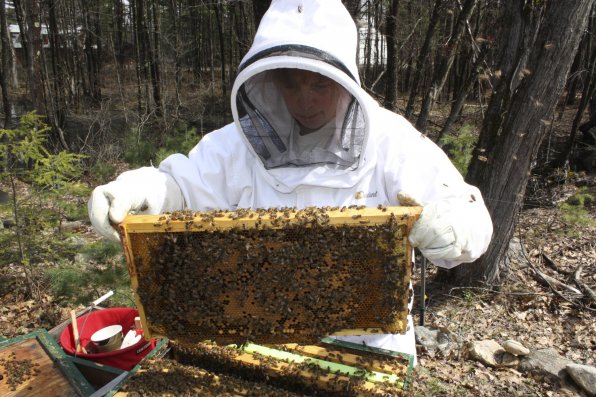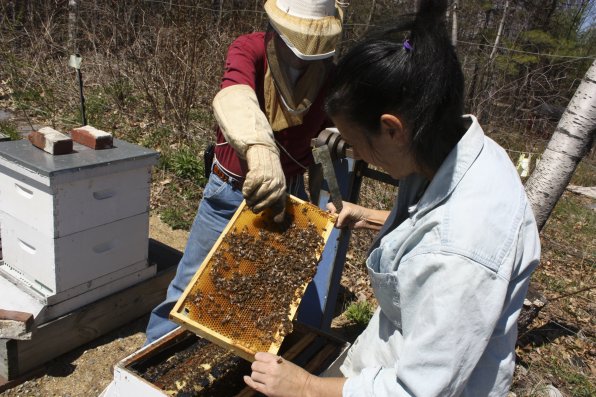Have you heard the buzz? There's a new craze taking the Concord area by storm – or should it be by swarm?
The age-old practice of beekeeping is on the rise around Concord, as evidenced by the recently formed Capital Area Beekeepers Association. Association President Randy Harris said that he noticed an influx of Concord-area attendees at the Candia beekeepers club meetings. Just like an overfilled hive will break off, move out and find a new home, Harris took the Concord contingent and formed a new club. Founded in September 2010, the Capital Area Beekeepers Association has quickly swelled from its 10 original members to around 125.
“We're seeing more and more people starting to keep bees,” Association Vice President Barbara Lawler said. Lawler is the club's vocal leader. (“I may be the president,” Harris said, “but Barbara's the queen bee.”) She brings her six-plus years of beekeeping experience to the table at the association's monthly meetings as well as their informative “Bee School” sessions.
A hive's-worth of bees can be purchased for about $85. Of course, apiculture (fancy talk for beekeeping) is a little more difficult than buying a box of bees and dumping it in a hive. That's where the wealth of resources offered by the Beekeepers Association comes in handy.
Beekeepers, or apiarists, keep their fuzzy little flying friends for a variety of reasons. First and foremost, they do it for the sweet, sweet honey. Locally harvested honey is not only delicious, it's also free from pasteurization and preservatives and it can actually help people deal with seasonal allergies. Since local bees make their honey from pollen and nectar gathered from local plants, ingesting it raises one's tolerance for those plant-based allergens.
“Inside that hive, you've got a medicine cabinet,” Lawler said. She is one of a growing number of people participating in apitherapy, which is the practice of applying bee stings to certain points of the body in a manner similar to acupuncture. The technique is used to treat arthritis, gout, tendinitis and even multiple sclerosis.
Association member Julie Eaton swears by the treatment, which she discovered purely by accident.
“I have arthritis in my thumb,” Eaton said. ” I got stung there and I didn't have a problem with it for six months.”
Set up your hive right, and you can also collect the pollen that the bees bring back on their little legs. These little beads are a colorful, sweet garnish for anything from toast to ice cream.
“Pollen has 100 percent of the vitamins, minerals and amino acids that you need,” Lawler said. “You could live on only pollen.”
The hive also yields propolis, the natural adhesive bees gather to seal off their combs, which is used in some homeopathic recipes. You can also gather beeswax, which can be used to make candles.
Now here's the tricky part for Concord residents. A city ordinance put on the books in 2001 states that beekeeping is only legal for Concord residents if they live on five or more acres of land. Even after meeting that requirement, residents still have to apply for a special exception to keep bees. Failure to comply with that ordinance is punishable by a $275 fine upon the first offense, although Zoning Administrator Craig Walker said he has never had to issue one of those fines.
“I think there are a lot of misconceptions about bees,” Walker said. “People don't know a lot about them, and education is key when dealing with legislation.”
Lawler said that there may be a movement in the works to modify that ordinance to make it easier for Concordians to get in on the apiculture craze. She said the current ordinance does little to keep people from being stung.
“Honeybees aren't the only things that sting,” Lawler said, “and they are not the bees that are coming after your sugary drinks. They have a GPS better than any Garmin you or I will ever have.”
To learn more about the Capital Area Beekeepers Association, visit capitalareabeekeepers.org, or attend one of their monthly meetings, held on the second Friday of every month at South Congregational Church in Concord.

























